LACKING LAW ENFORCEMENT: As crime on the Crow reservation increases, so must the police force that protects
Story by Zeno Wicks IV
Photos by Louise Johns
AT 8:40 P.M., a Ford Crown Victoria patrol car turned on its lights and sped down the frontage road to Hardin, leaving the dispatcher alone at Crow police headquarters. Within the following half hour she would answer a call for police in Crow Agency, but no officer was available to respond. Nearly 50 minutes would pass before the Crown Victoria would return to the small brick building, located off Interstate 90 near the Little Bighorn Battlefield National Monument.
The vehicle would remain parked, its engine running and tail lights glowing red in the waning daylight of March 29. Five minutes later, tribal police officer Jeff Grisham rushed back into the running car and drove north out of the lot to respond to a call near Little Bighorn College.
The 2-mile road bends east past the grandstand, a 200-foot-tall structure for rodeos and other events, and wraps back over Custer Creek into town. Kitty-corner to campus, on the southeast side, is a cul de sac with trailers and homes of varying conditions.
Thirty minutes earlier Bernadette Charette, who lives at the end of the cul de sac near Custer Creek, put on her blue robe and slippers to let out LaFee and Molly — a schnauzer and a toy fox terrier. Outside the two dogs bolted under the camper parked on the front lawn of the small blue home.
Charette, 78, focused through her large, round spectacles on the blue house across the way.
A moldy and tattered mattress sat just below the sill.
As her eyes adjusted, Charette noticed the vague outline of a girl in the corner of the house near the mattress. The girl stood still, shivering. They made eye contact. Charette, a small woman with white hair and hunched back immediately turned towards the camper.
“Molly! LaFee!” she whispered urgently, opening the front door. “Get inside!”
She locked the door behind her and told her husband, Fred, what she saw. They waited up the next half hour, but there was no movement outside.
There was no response to the call for police.
After deciding it was safe to sleep they headed to bed. It was then, Charette noticed the search lights of a tribal officer’s car. The light passed over their home and then the home across the way, illuminating the mattress and the corner. The girl was gone.
Shortly after, another car arrived. Dorothea Adams, Charette’s neighbor, had called the police because a granddaughter had shown up to her house drunk. It’s illegal to drink on the Crow reservation. When Grisham and tribal officer Tim Smells knocked on the door of Adams’ new green double-wide trailer home, she answered, but her granddaughter had run long ago.
“She knows she isn’t supposed to be there drunk,” Grisham later says. “Dorothea has to call them in sometimes.”
On a busy weekend night, though, officers aren’t able to respond in time to such calls. Unlike Adams, but like most on the Crow Reservation, Charette reacted differently.
“I didn’t call the police,” Charette later said. “I don’t call the police.”
CHARETTE’S FEELINGS are shared by a majority on Crow. And not without reason.
The reservation has a complicated public safety system that consists of both a tribal police force and a larger federal law enforcement agency, run by the Bureau of Indian Affairs Justice Services. The BIA, which has full jurisdiction over the Crow reservation, is a small division of the federal government. This means personnel constantly changes as officers seek out higher BIA or federal positions for higher pay, stature and improved benefits.
In 20 years, the Crow has been unable to create a version of its own steady law enforcement team to serve and protect the reservation with any kind of consistency.
The result is an increasing polarization between the BIA police and the tribe whose laws they are contracted to enforce. There has also been a steady increase in crime for more than three decades.
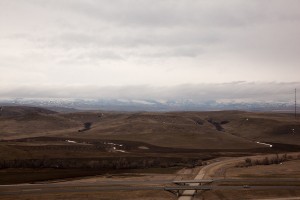 As a smaller part of the larger BIA system, the Crow have seen several successful police chiefs come and go. Effective leaders are eventually channeled into higher positions, making the Crow reservation a mere stop toward greater opportunity.
As a smaller part of the larger BIA system, the Crow have seen several successful police chiefs come and go. Effective leaders are eventually channeled into higher positions, making the Crow reservation a mere stop toward greater opportunity.
Despite his efforts to improve enforcement on the reservation, Tony Larvie is a recent example in history of this upward momentum.
Larvie was appointed chief of police December 2011. At the time, he was a drug investigator for the BIA Offices of Justice Services in Billings. He was hired in the wake of Crow’s most violent year in recent history. According to the BIA Justice Department, in 2011, stabbings and shootings claimed the lives of five — four in Lodge Grass and one in Pryor — along with 45 other serious incidents including aggravated assault, arson and sexual offenses.
Larvie reports the Crow police department had a total of nine officers, tribal and BIA, when he arrived. But with Larvie came a rush of support from both the Crow tribe and the BIA for more police officers.
Tribal officers, who are supported through the Crow tribe and trained in state academies, were given more funding through grants supplied by the Crow tribe. The Washington D.C.-based BIA offices also allocated money for more officers, who are trained at a federal base in New Mexico. In total, Larvie’s law enforcement staff more than doubled.
During the summer of 2012, Crow administrative officials reported 10 BIA patrol officers, six tribal police officers, two supervisory advisors, and three investigators at the station. Larvie believes the increase helped lead to more arrests for disorderly conduct, public nuisance and drinking-related offenses in 2012.
These arrests, he said, have a correlation to the nearly 20 percent decrease in more serious crimes recorded in 2012 — the BIA Justice Department recorded 42 serious incidents the entire year.
But the flaw remains.
Larvie is no longer police chief. And many of the positions created during his tenure are now vacant.
THE MAIN entrance of headquarters was blocked with unused cabinets, boxes and exercise equipment. The east entrance is used by both police and the general public.
Upon returning from the failed search of Dorothea Adams’ granddaughter, Grisham parked his patrol vehicle near the others. A light from the west window illuminated a Ford truck, investigation van, and eight Ford Explorers parked in two perpendicular lines on the grass. They haven’t been moved in years because they don’t have the tribal officers to drive them.
Four days later in the Crow police meeting room, Grisham recalled the evening. Grisham is a wide man for 5 feet 9 inches. His black BIA garb was uncomfortably tight over the bullet proof vest he wore.
Grisham said such busy weekend nights, which require long hours, are why he wants to switch to BIA. And the reason so many tribal cars sit vacant.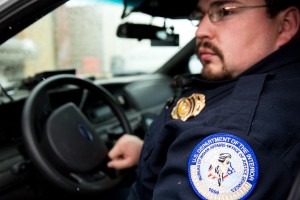
“The bad thing about being a tribal officer is that we don’t get benefits, health insurance, retirement. And there is always the job security. There’s always things going on with the tribe and who knows where cuts are going to be made,” Grisham said with a chew tucked in his right lip. “I think that with a majority of the tribal guys that we have, everyone has mentioned that they want to go Bureau.”
Down the hall Police Chief Jose Figueroa Jr. sat at his wood desk. Various papers were stacked on the dressers surrounding the room. A door leading to a back patio was blocked by a cabinet. In front of him, two Dell monitors displayed separate email drafts.
Figueroa became police chief in August 2013. He is the second since Larvie was promoted to district director of drug enforcement in Billings in February 2013. He is aware of the allure that the BIA has for many of his officers.
“The perception is that everyone that goes to Crow, typically, goes on to bigger and better things,” Figueroa said, leaning back in his leather chair. “And that’s what most of the staff has asked me, ‘How long are you going to be here?’”
Both of Figueroa’s predecessors were promoted to Billings. The current BIA Justice Department Director in Washington, D.C., Darren Cruzan, spent just under a year at Crow in 2004 before continuing up the promotion chain. Indeed, it seems the natural trajectory for those police chiefs that pass through Crow is up. This has kept Crow police numbers down.
“First and foremost, as you can see on the board,” Figueroa said, pointing to a whiteboard listing Crow officers. “We need to get more guys here.”
Figueroa is tall, more than six feet. His hair is cut high and tight, exposing a broad forehead and thin eyebrows. He is half Mexican, but grew up Assiniboine and Sioux on the Fort Peck Reservation. He has a wide smile betraying the red eyes and heavy sockets of a thoughtful man low on sleep.
Written in red dry-erase marker was Figueroa’s name along with the names of six BIA officers, a lieutenant and two tribal officers. Additionally, two names filled the slots next to Sex Offender Registration and Notification Act officer and Highway Patrol officer. Four BIA officers positions, along with one tribal position, were blank.
Figueroa said the BIA provides funding for 15 officers, including a police chief and two lieutenants, and the tribe pays for three tribal officers and handles grants for three specialty officers. He has more budget for more officers than Larvie did just two years before. But the officers aren’t there to fill the positions.
Just as police chiefs are pumped through Crow, so are BIA officers. Figueroa said it’s standard for the BIA to re-assign officers to different reservations as needed.
“When I first got here in August, I established a Lodge Grass officer and a Pryor officer because that’s where our needs are,” Figueroa said. “And we had five guys then, but we have lost five guys since then.”
The Pryor officer is no longer, and Figueroa keeps up with the duties of the four empty BIA officer positions.
OF THE seven reservations in Montana, three utilize their own tribal law enforcement, two utilize state law enforcement and laws, while two contract through the BIA. Crow falls in the latter while still employing a few tribal officers. But many on Crow believe the tribe should employ its own police force.
“The biggest problem we have here is that the guys that we have here on the ground want to do the work, but they’re being dictated by people out of the area office, which is in Billings. They don’t understand what is going on here,” said Tribal Chairman Darren Old Coyote in his office in the Crow Tribal Administration Building. “And that is the biggest problem because they have to answer to an outside entity, where we are sitting here and we know the problems, and where to do this and that.”
Old Coyote says to get rid of the problem, the tribe would have to invoke Public Law 93–638, the Indian Self-Determination and Education Assistance Act of 1975, which allows U.S. tribes to contract from the federal government a number of public service programs such as health care, law enforcement and education.
By “638-ing” the entire program, the Crow would receive the federal dollars that are currently used to pay for the federal BIA police force and use that to run a tribal law enforcement program.
“That’s an option that we are looking at,” Old Coyote said, “but at the same time we are mindful of the liabilities that we would have to assume.”
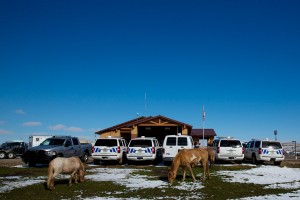 Even after 638, federal grants would not be near enough to pay for a law enforcement agency large enough to appropriately cover the Crow reservation. At 2.3 million acres, Crow is the largest reservation in Montana. To sufficiently cover the land, Crow needs a police force larger than the average reservation, which would mean the need for more money.
Even after 638, federal grants would not be near enough to pay for a law enforcement agency large enough to appropriately cover the Crow reservation. At 2.3 million acres, Crow is the largest reservation in Montana. To sufficiently cover the land, Crow needs a police force larger than the average reservation, which would mean the need for more money.
Director of Crow Land Security Henry “Hank” Rides Horse, said there would need to be 35 police on staff to appropriately cover the reservation. A number, Rides Horse believes would cost roughly $2.5 million dollars annually.
“Our next step is to be utilizing our resources. And in doing so, we won’t be asking from the U.S. government,” Rides Horse said. He added that the tribe has several natural resources, including coal, water and tourism. “We have to start utilizing them in order to be self sufficient, not only law enforcement, but the whole government.”
THE CROW tribe has tried to operate its own law enforcement before. Since the 1905 territorial establishment, Crow had been in charge of creating and enforcing their own laws within the reservation.
In 1980 the Crow police began to supplement tribal officers with BIA investigators. But it wasn’t until 1990 that the tribe’s police force began contracting a majority of their law enforcement through the BIA.
In the early ‘70s, Thomas Larson Medicinehorse, 74, was a tribal officer based out of Crow Agency. He says that during that time, there were also substations in Lodge Grass and Pryor.
When Medicinehorse was 23, he decided to attend the BIA police academy, and enrolled in the first graduating class. In 1990 he returned to the reservation and ran for sheriff of Big Horn County to battle the racial profiling Crow tribal members reported experiencing by sheriff’s deputies. He became the first Crow sheriff of the county, a position he held for 16 years.
But as civil rights and law enforcement took a large step forward at the county, tribal law enforcement faced crisis on the reservation. Financial cuts hit Crow police the hardest.
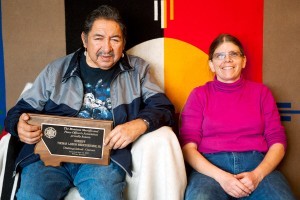 “The tribal officers were qualified to do their work,” Medicinehorse says. “It was the leadership. Some people were advanced beyond their capabilities, and then the tribe used up the money. So the tribal police were left without funds. They didn’t have no money to go out and patrol. And they only had about five or six officers at that time, because they couldn’t hire anymore.”
“The tribal officers were qualified to do their work,” Medicinehorse says. “It was the leadership. Some people were advanced beyond their capabilities, and then the tribe used up the money. So the tribal police were left without funds. They didn’t have no money to go out and patrol. And they only had about five or six officers at that time, because they couldn’t hire anymore.”
Sidney “Chipper” Fitzpatrick Jr., who was the officer stationed in Pryor, was one of those to leave. He had been the D.A.R.E. officer for Pryor High School, but the tribe offered few benefits to law enforcement officers, benefits offered with a job at the BIA. He was the last officer stationed in Pryor for more than two decades.
“I think that when I left, it changed then,” Chipper said. “And there is more people. When I was a cop, we were at about 7,000, now we are up to 13,000.”
But until the Crow can revert to the old system, Chipper, now Bighorn County Commissioner, believes the communication between law enforcement and Crow citizens needs to improve.
“It’s not just law enforcement, it’s everybody. It’s the community that networks together to tackle this issue — violence, drugs and alcohol,” Chipper said. “Just the law enforcement ain’t gonna’ change it, we need to change as a reservation.”
TO FACILITATE networking between community and law enforcement, the Crow have assigned an innovative position, director of public safety, to an innovative individual.
William Falls Down sat at the wooden desk he found abandoned in the east wing of the Crow Tribal Administration building. He wore a red, button-down shirt, black jeans and black cowboy boots. Falls Down’s wide smile showed displaced teeth.
He was hired when Old Coyote was elected and adapted a room tucked in the middle of the administration building. He is a Republican surrounded by a predominantly liberal staff. It is his experience that got him to the position.
Falls Down has been in law enforcement for more than 28 years. As a BIA officer, he has served in 87 different reservations in a variety of positions.
Born Crow, Falls Down returned to his reservation to serve with Crow Fish and Game before switching to director of public safety. Through his experience, Falls Down also believes the tribe should take over the public safety program. But he doesn’t believe it will happen anytime soon, even under the administration that hired him. Thus he looks at what he can do with the BIA officials he is given.
“We give them (the BIA) the authority to supervise our tribal officers,” Falls Down said. “The chief of police, Jose Figueroa, works with me on a daily basis on the daily functions of the tribal police.”
Since starting his position, Falls Down said Figueroa is the first BIA Police Chief that has been eager to work with the tribal officers the Crow supply. Their working relationship goes back to Figueroa’s childhood when Falls Down used to babysit him on the Fort Peck Reservation.
Figueroa said their closeness has opened up a dialogue that he is surprised didn’t happen before.
“We both said that we have to work together. We cannot not work together. It doesn’t work that way,” Figueroa said. “I don’t know why they had these issues before, but we have to work together. The government and tribal still have to intertwine because we are both trying to accomplish the same mission, which is services to the community and protection.”
- The Crow Indian Reservation is 2.3 million acres, making it the largest in Montana.
- Thomas Larson Medicinehorse and his wife, Patti Medicinehorse, sit in their house in Crow Agency. Larson was the first Native American to become sheriff of Hardin County. He was sheriff for 16 years before being nominated for Sheriff of the Year in 2002.
- Sidney “Chipper” Fitzpatrick Jr. owns Apsaalooke Contracting. He employs 34 people, half of which are former convicts. In the summer of 2013, Fitzpatrick signed a $6.2 million contract with Crow Agency to replace a 75-year-old water and sewer system. He is a Big Horn County commissioner and a former Bureau of Indian Affairs’ police officer.
- Charles Sanchez is a foreman for Apsaalooke Contracting in Crow Agency. Sanchez, a Northern Cheyenne tribal member, came to the Crow reservation after hearing about the job opportunity in August 2012. He previously served 12 years in prison for dealing methamphetamine.
- Jeff Grisham is a tribal police officer stationed in Lodge Grass on the Crow Indian Reservation. Although the tribe funds tribal police officers, they still operate under the Bureau of Indian Affairs. Grisham said eventually he would become a BIA officer for the higher pay and benefits.
- The greatest challenge for law enforcement officials on the Crow reservation is covering the vast territory. The area near Wyola is about 36 miles from the Crow Agency headquarters. Other areas such as Pryor are up to 90 miles away.
- Horses roam the lawn of the Crow police department in Crow Agency. Tribal patrol vehicles sit behind them, many not in use because there aren’t enough officers to operate them.
- Bernadette and Fred Charette sit with their dog, Molly, in Bernadette’s home in Crow Agency. As a young girl, Bernadette lived in the same house before moving away to be a school teacher. She returned six years ago when her grandmother left her the house. Bernadette says that although much has changed in Crow Agency since she grew up there, she still feels safe living there.
- Lodge Grass is about 22 miles from the police department headquarters in Crow Agency. Lodge Grass has the highest crime rate of any town on the reservation and the Bureau of Indian Affairs has stationed one tribal officer there.
- Although Interstate 90 runs through the eastern side of the Crow Indian Reservation, much of the expansive 2.3 million-acre reservation is only accessible by smaller roads and highways making it hard for law enforcement to police.
 Native News Project 2014 | School of Journalism – University of Montana Native News Project 2014
Native News Project 2014 | School of Journalism – University of Montana Native News Project 2014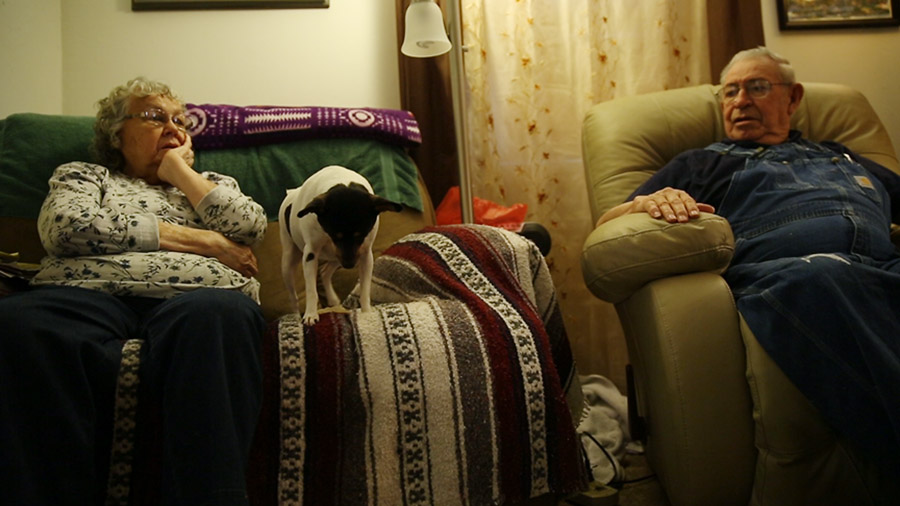

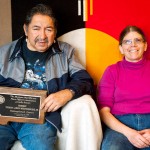




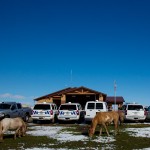





Recent Comments